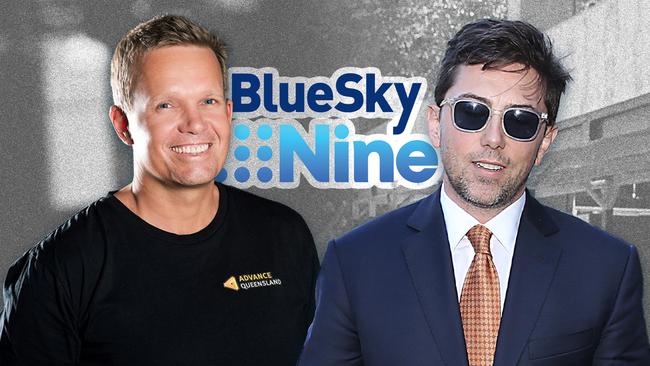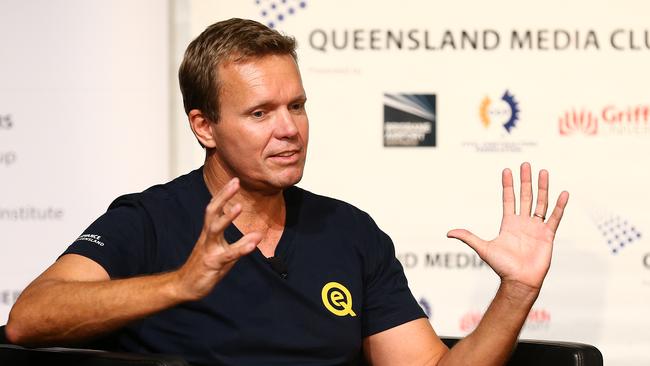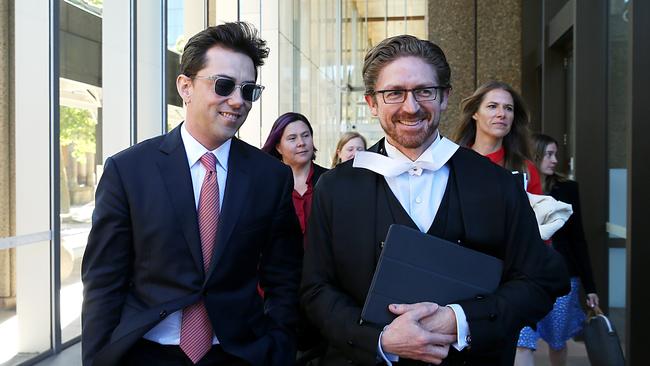Blue Sky’s former boss says Glaucus orchestrated a conspiracy to take down the company
Shocking new claims allege investment firm Blue Sky was brought down by a conspiracy, with the research which helped destroy the company the centre of a ‘confidence trick’.

The short-selling attack on Blue Sky Alternative Investments which ultimately destroyed the billion dollar-plus company was a “confidence trick” at the heart of a “conspiracy” designed to profit from its demise, a $445m lawsuit lodged by its former managing director claims.
Blue Sky founder and former managing director Mark Sowerby has launched a class action alleging Glaucus Research directors Matthew Wiechert and Soren Aandahl worked in concert with several brokers, Sydney hedge fund Totus Capital, and more as-yet unidentified “insiders” to build short positions in the company, then profit after publishing a report which claimed Blue Sky was effectively a Ponzi scheme.
The claim also names former AFR columnist Joe Aston and his former employer Nine Entertainment, as well as the corporate regulator itself, alleging a conspiracy to destroy the company he founded.
Mr Sowerby’s company Blue Dog Group lodged the claim in Brisbane’s Supreme Court alleging, among other things, Glaucus worked together with Aston, law firm Gadens and brokers Credit Suisse, Euroz Hartleys and Argonaut, to put into effect the short attack on Blue Sky, and Gadens in particular had advance warning a short attack was about to be launched.

The claim also accuses the Australian Securities and Investments Commission of sitting idly by and allowing what Mr Sowerby alleges constituted insider trading to occur.
Blue Sky was the target of a short selling attack launched on March 28, 2018, with the US-based Glaucus alleging Blue Sky had vastly overstated its assets under management, its directors were unduly enriching themselves, and it was effectively a “Ponzi-like” scheme.
Short selling involves borrowing shares in a company with an agreement in place to buy them back at a predetermined price, with holders benefiting should the share price drop.
Brisbane-based Blue Sky, which had billions of dollars worth of investments ranging from a burrito chain to an online shoe retailer, responded to the claims in the Glaucus report, however, its shares plummeted when they returned to trade the following week, falling from $11.41 to $5.62.
Blue Sky ultimately went into administration the following year, wiping out more than $1bn in equity value for its shareholders.
Two class actions against Blue Sky and its directors were subsequently launched, which are ongoing, having being consolidated into one claim.
However, Mr Sowerby, who resigned from Blue Sky two years before the Glaucus attack but still held a substantial of number of shares in the firm, has now counterattacked with his own action, claiming the Glaucus strategy was a “confidence trick” and those involved “conspired” to damage Blue Sky.
“The Glaucus Blue Sky Report was the central element of a confidence trick successfully perpetrated by the Glaucus parties with the involvement of the other defendants which seriously damaged the value of Blue Sky’s shares and harmed the plaintiff and group members,’’ the claim says.
“The Glaucus report had the title, appearance and apparent content of a rigorous and detailed equity research report prepared by a professional equity research firm, and the Glaucus parties had cultivated and publicised a reputation for successfully identifying complex corporate frauds through rigorous research and analysis.’’
The claim says “certain persons (together, the ‘Glaucus insiders’) agreed to reward the Glaucus parties for publishing a report alleging serious fraud by Blue Sky, its directors and officers’’.
The claim says it has identified Sydney hedge fund Totus Capital as an “insider” while other parties were yet to be identified.
“The Glaucus report refers to the Glaucus parties having clients and/or investors (plural) with short positions in Blue Sky shares,’’ the claim says.

Mr Sowerby’s claim says the Glaucus report made eight substantive claims undermining the Blue Sky business, purportedly drawing from publicly available information, and inviting shareholders to verify the claims, while knowing most would not do so.
And further, it said given the strength of the claims, and the more than 40 articles Aston wrote attacking the company and its directors, it would have made sense for shareholders to panic and sell out, even if the claims were not true — with Sowerby’s claim saying they were not.
“As the allegation made by the report was so serious and included that Blue Sky was a Ponzi-like scheme, it was rational for an individual … shareholder to sell their shares as soon as possible at the available price even on rumour of it, and especially given the Gadens statement and class action, Mr Aston’s articles … and ASIC’s inaction, on the expectation that other Blue Sky shareholders would be doing so, and irrespective of their own belief in its truth,’’ the claim lodged with the court says.
“The resulting falls in Blue Sky’s share price were then falsely represented by the Glaucus parties and Mr Aston, and perceived by a critical mass of market participants, as evidence of the truth of the allegation, and Blue Sky’s denials as further evidence of its dishonesty, which triggered a self-sustaining cycle of further falls in Blue Sky’s share price.’’
Aston and Nine were successfully sued for defamation by former Blue Sky director Elaine Stead in 2020 and ordered to pay $280,000 in damages as well as her court fees, estimated at more than $1m.
Justice Michael Lee said Aston had perpetrated a “sustained campaign of offensive mockery”, which amounted to a “form of bullying”.
Aston had referred to Dr Stead as “stupid” a “cretin” and said she invested in “peanut start-ups’’.
Justice Lee said it wasn’t a surprise Dr Stead and Blue Sky came under Aston’s scrutiny, but Dr Stead had argued “not only did Mr Aston cross the line the law draws, but that he pole vaulted it’’.
Mr Sowerby’s claim says Aston was in contact with the Glaucus parties well before the short selling report was released, even flagging in late 2017 something of import would happen to Blue Sky the following year.
The claim says Aston promoted his “apparent skill and prescience in predicting the Blue Sky ‘collapse’’’, without admitting his involvement in the “scheme … where to not do so was at least misleading’’.
It also says he “had a malicious interest in the harm caused to the group members’’.
Mr Sowerby says the brokers were involved in “unusual” trading in Blue Sky shares ahead of the short attack, and they were “obliged to notify ASIC as soon as practicable if (they) had reasonable grounds to suspect that a person had placed an order or entered into a transaction on the market while in possession of inside information’’.
The claim says Blue Sky complained to ASIC, saying the Glaucus report “contained fundamental errors of fact and analysis and was materially misleading’’, but ASIC assessed the Glaucus report and recommended no action be taken.
“ASIC knowingly permitted serious, uncompensated harm to be done to the plaintiff and group members … without being able to articulate a single rational or coherent reason for doing so,’' the claim says.
“The Glaucus report and Glaucus rebuttal contained numerous improper claims that Blue Sky directors and officers, and many unrelated third parties, committed serious fraud or were dishonest.’’
Mr Sowerby is seeking at least $445m in reparations for himself and other shareholders, based on the plunge in the company’s share price from $11.41 before the Glaucus report was released on March 28, 2018, to $5.62 by the time the share market had closed on April 5.
He is also seeking exemplary damages from ASIC, which the claim says ignored its own advice on what constitutes insider trading and should have intervened.
A spokesman for Mr Sowerby’s company Blue Dog said on Wednesday the company had “commenced representative proceedings in the Queensland Supreme Court to recover loss suffered by Blue Sky shareholders from the publication of the Glaucus Report in March 2018.
“It is alleged that Australian and US defendants were involved in insider trading, false and misleading conduct, and civil conspiracy.
“Blue Dog Group is wholly funding the proceedings. As the matter is now before the court, it is not appropriate to make any further public comments.’’
The claim was lodged in recent days and while all Australian parties are understood to have been served, no defences have been filed to date.
Aston, Argonaut and Euroz Hartleys declined to comment. All other respondent parties were contacted for comment.




